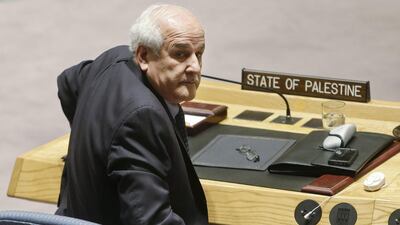UNITED NATIONS // The UN Security Council failed to adopt a resolution on Palestinian statehood that was strongly opposed by the United States.
China, France and Russia were among the eight countries that voted in favour of the text, but the resolution fell short of winning the nine “yes” votes necessary for adoption in the 15-member council.
Australia and the United States voted against, and five other countries abstained, including Britain.
The resolution drafted by the Palestinians and backed by Arab countries would have paved the way to a Palestinian state with East Jerusalem as its capital.
It set a 12-month deadline for Israel to reach a final peace deal with the Palestinians and called for a full Israeli withdrawal from the Palestinian territories by the end of 2017.
Palestinian envoy Riyad Mansour accused the council of failing to shoulder its responsibilities and vowed to seek other venues to gain recognition.
“The Palestinian people and the world can no longer wait. That message, despite the regrettable outcome today, is especially clear,” he told the council.
Mr Mansour said the Palestinian leadership will meet on Wednesday to decide on the next steps.
Security Council member Jordan had requested the vote despite opposition from the United States, which argued that the resolution did not address Israel’s security concerns and set arbitrary deadlines.
“This resolution sets the stage for more division, not for compromise,” US Ambassador Samantha Power told the council. “This text addresses the concerns of just one side.”
Ms Power defended the US position in favour of direct talks, saying “peace will come from hard choices and compromises that must be made at the negotiating table.”
US Secretary of State John Kerry had lobbied in the days leading up to the vote, calling 13 foreign ministers to explain the American opposition.
Washington was not, however, compelled to resort to its veto power to block the measure — a move that could have undermined US standing in the Arab world.
A US veto risked angering key Arab allies, including partners in the US-led coalition carrying out air strikes against ISIL in Syria and Iraq.
Argentina, Chad, Chile, Jordan and Luxembourg joined China, France and Russia in supporting the resolution.
Lithuania, Nigeria, Rwanda and South Korea abstained, along with Britain.
Diplomatic sources said Nigeria had been expected to support the resolution and changed its stance at the last minute.
France’s envoy said he backed the resolution because of an “urgent need to act” and vowed to continue pressing for a UN role in reviving Israeli-Palestinian peace talks.
“Our efforts must not stop here. It is our responsibility to try again, before it’s too late,” said Francois Delattre.
International alarm is growing over the continuing violence and the failure to restart negotiations that last broke down in April, when Mr Kerry led a push for peace.
European Union foreign policy chief Federica Mogherini said the vote underlined the “urgency” for Israel and the Palestinians to resume peace negotiations.
She vowed a renewed EU effort to achieve a two-state solution “now more than ever.”
The vote capped a three-month campaign by the Palestinians at the United Nations to win support for a resolution that sets a time frame for ending the Israeli occupation.
The Palestinians have said they are prepared to join the International Criminal Court to launch legal action against Israel and use other international for to press their case if the resolution fails.
Israel — represented by the mission’s number three Israel Nitzan — delivered a terse, four-sentence address to the council.
“I have news for the Palestinians — you cannot agitate and provoke your way to a state,” he said.
“I urge the council to stop indulging the Palestinians and put an end to their march of folly.”
*Agence France-Presse

